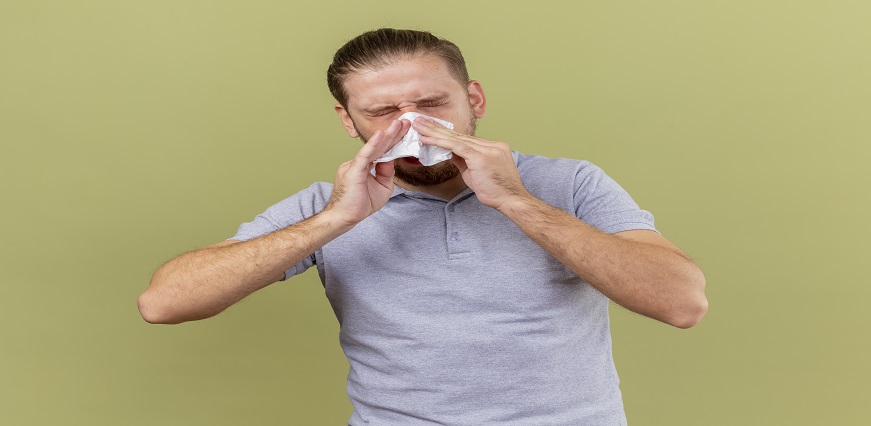





No lab centers are available in this city

Do you find yourself constantly reaching for a box of tissues because of a runny nose? Don't worry, you're not alone! A runny nose is a common ailment that can be caused by various factors such as allergies, infections or even changes in weather. In this blog post, we'll discuss the symptoms and causes of a runny nose, effective treatments to alleviate your discomfort and prevention measures to avoid future occurrences. Keep reading to learn more about how to combat those pesky sniffles!
A runny nose, also known as rhinorrhea in medical terms, is the term used to describe excessive mucus production and discharge from the nose. Your nasal passages are lined with mucous membranes that produce this fluid which helps to keep your nasal cavities moist and clean. However, when these membranes become inflamed due to various reasons such as allergies or infections caused by viruses or bacteria, they release an excess of mucus.
A runny nose can be quite bothersome, but fortunately, several treatment options are available to provide relief. Over-the-counter (OTC) medications such as decongestants and antihistamines can help alleviate a stuffy or runny nose. These drugs work by reducing the swelling in nasal passages and blocking histamine production, which contributes to inflammation.
Nasal saline sprays or rinses are another effective remedies for clearing out mucus and soothing irritated nasal tissue. They contain saltwater solution that helps moisturize the nasal cavity while flushing away irritants and excess mucus.
If you prefer a more natural approach, try using a humidifier in your living space to add moisture to the air. This can help reduce congestion by thinning out mucus secretions. You may also find relief through inhaling steam from hot water or taking warm showers.
Preventing a runny nose may not be possible in all cases, especially when it is caused by allergies or infections. However, there are some measures you can take to reduce the risk of developing a runny nose.
While a runny nose is often nothing to worry about, there are certain cases where you should seek medical attention. If your symptoms last for more than 10 days or if they worsen after the first week, it's time to see a doctor. Additionally, if you experience severe headaches or facial pain combined with your runny nose, this could be a sign of an infection and requires immediate medical attention.
If you have a weakened immune system due to conditions such as HIV/AIDS or cancer treatment, any signs of illness including a runny nose should not be taken lightly and warrant an appointment with your healthcare provider.
For babies under three months old who have developed symptoms of a runny nose, it is important to contact their pediatrician immediately as their immune systems are still developing and may require additional care.
After going through the symptoms, causes, treatments and prevention of a runny nose, it is evident that there are various factors that lead to this condition. Some of these factors include allergies, cold weather, bacterial infections or even irritants like tobacco smoke.
Although a runny nose is not life-threatening, it can be quite uncomfortable and affect one's quality of life. It is important to take steps to prevent and treat it before it progresses into something more serious.
 Allergy Test
Allergy Test
 Anemia Test
Anemia Test
 Auto immune
Auto immune
 Blood disorder
Blood disorder
 Bone and Joint
Bone and Joint
 Cancer Test
Cancer Test
 Cardiology Test
Cardiology Test
 Covid Recovery
Covid Recovery
 Dengue Test
Dengue Test
 Depression
Depression
 Diabetes Test
Diabetes Test
 Fatigue
Fatigue
 Fever Test
Fever Test
 Full body
Full body
 Gastro Test
Gastro Test
 Gastrointestinal
Gastrointestinal
 Gynaecology Test
Gynaecology Test
 Heart Test
Heart Test
 HIV Test
HIV Test
 Hormone Test
Hormone Test
 Hypertension
Hypertension
 Immunity Test
Immunity Test
 Infectious Disease
Infectious Disease
 Infertility Test
Infertility Test
 Influenza Test
Influenza Test
 Iron Test
Iron Test
 Kidney Test
Kidney Test
 Liver Test
Liver Test
 Lung Test
Lung Test
 Nephrology
Nephrology
 Obesity
Obesity
 Orthopedics Test
Orthopedics Test
 Physician
Physician
 Pollution Health Checkup
Pollution Health Checkup
 Pregnancy Test
Pregnancy Test
 Prostate Test
Prostate Test
 Senior Citizen Test
Senior Citizen Test
 STD Test
STD Test
 Thyroid Test
Thyroid Test
 Tuberculosis Test
Tuberculosis Test
 Vitamin Test
Vitamin Test
 Women Health Test
Women Health Test
Sign up takes less than 60 secs and gives you access to your offers, orders and lab tests.
Looks like you are not registered with us. Please Sign up to proceed
OTP will be sent to this number by SMS
We have successfully received your details. One of the agents will call you back soon.
 To reach our help desk call 9213188888
To reach our help desk call 9213188888
No Lab Centers are available in this city
Looks like you are not registered with us. Please Sign up to proceed
OTP will be sent to this number by SMS
Not Registered Yet? Signup now.Looks like you are not registered with us. Please Sign up to proceed





 7982100200
7982100200.png)